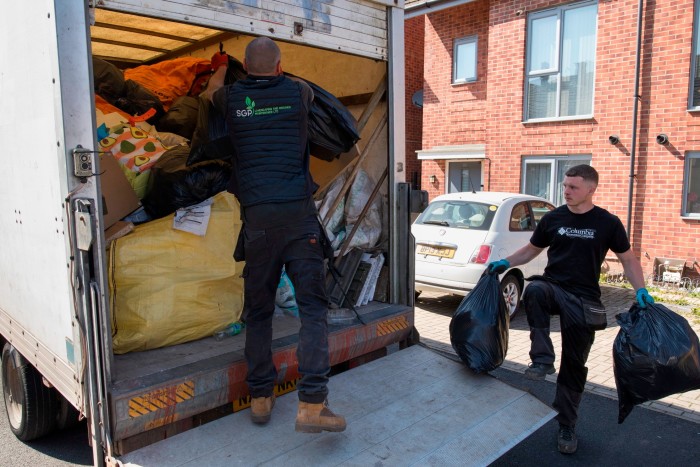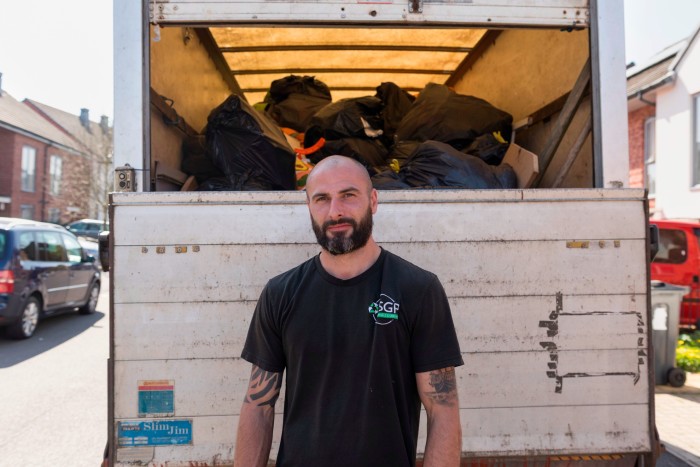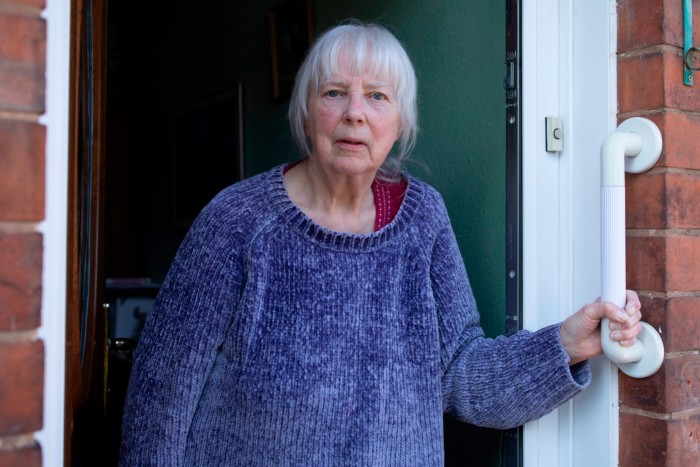Unlock the Editor’s Digest for free
Roula Khalaf, Editor of the FT, selects her favourite stories in this weekly newsletter.
A large white lorry loaded with rubbish careens around a corner and down a cul-de-sac in the quiet east Birmingham suburb of Sheldon. Gary Fryar hops out of the truck and starts loading black bin bags that have piled up against pebble-dash walls.
“Since I put the post on Facebook we’ve done six different jobs like this one,” says Fryar, the enterprising co-owner of a waste collection service who has started to market himself to residential clients feeling the impact of a strike by council bin workers.
As the industrial dispute drags on, the lingering waste problem has exposed deeper inequalities between the city’s affluent neighbourhoods and more deprived inner-city areas.
While suburban residents have been able to afford commercial waste clearance, the denser, more disadvantaged parts of the city are struggling to cope with fly tipping, vermin and unpleasant odours.

Private callout costs can range from £15-£30 per residential wheelie bin, although Fryar says he is currently offering a discount.
Rubbish collection in the city has been severely reduced since the Unite union began all-out industrial action last month. The strike was called in response to Birmingham city council’s decision to restructure the service, which Unite says will mean an £8,000 pay cut for some workers.
A spokesperson for Birmingham city council, which filed for effective bankruptcy in 2023, said the changes to bin collection were “in line with national practice and provides for a better service to our citizens”.
A £100mn software debacle and a £250mn liability for an equal pay claim brought after a previous Unite strike in 2017 has left Birmingham’s public finances in a shambles. The latest council budget included a hefty council tax rise as well as cuts to library and adult social care services.
Unite and the council are currently taking part in intense negotiations to resolve the dispute. Earlier on Thursday, deputy prime minister Angela Rayner called on the union to suspend the strike.
“This dispute is causing misery and disruption to residents and the backlog must be dealt with quickly to address public health risks,” Rayner said during her visit to Birmingham.
“My department is working with Birmingham city council to support its response to accelerate clearing the backlog and rapidly improve the situation on the ground.”

However, Unite’s local government head Clare Keogh said the Labour government was unfairly blaming waste workers for the dispute, adding that comments from front bench MPs this week had been “disappointing and in some cases disrespectful”.
Along with Birmingham, Unite bin collectors are also on strike in Sheffield and narrowly avoided a strike in Redbridge and Edinburgh last year. Keogh described refuse work as “difficult, dirty and dangerous”.
She said council cuts to waste service funding and the increased reliance on agency workers meant that bin workers across the county were “angry”. Keogh added that further strike action by refuse workers could be on the horizon.
Birmingham, which is Europe’s largest local authority by number of people served, is home to some of the most deprived areas in the country.
A study released by the National Institute of Economic and Social Research found that poverty in Birmingham was worse than the least affluent areas of Slovenia.
Alexis Paton, director of the Centre for Health and Society at Aston University, said the disparity in the build-up of rubbish in Birmingham was in part due to the fact that richer neighbourhoods could afford private collection.
“If you don’t want to join the wait-list for the NHS and you have the money, you can go for a private option. We’re seeing the exact same thing happen with rubbish.”
Paton said the conditions in poorer neighbourhoods were leading to an increase in rodents, infections and access issues for people with disabilities. “We’re starting to see some real inequalities playing out.”

Birmingham city council said street cleaning teams were active and blamed irregular bin collection on earlier efforts by Unite to block refuse lorries from leaving depots.
“As certain depots were able to get more wagons out than others, this led to an uneven collection across the city,” a council spokesperson said.
Unite members say they have been stopping trucks from leaving depots due to “health and safety” concerns.
In Sparkhill, which has some of the city’s highest levels of child poverty, the reduction in waste services has started to cause tensions.
The manager of Goldens supermarket told the Financial Times they were fighting against nightly fly tipping in their loading bay as well as an infestation of mice.
Linda Ellis, a former dressmaker, wedding cake maker and canteen worker, has lived nearby on the same road for more than 50 years.
“I’ve never seen it this bad,” she said. A skip outside her neighbour’s house had turned into a mountain of bin bags. “Even though the door is closed, you can still smell it.”









